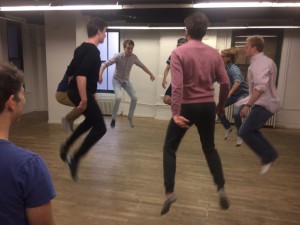Quinn Cavin ’19 – I learned more in five days about storytelling in New York City than I learned in months in Crawfordsville. It’s simply a matter of the extreme diversity of art in New York City and the acceptance of experimental and bold stylistic choices. I saw the most inspiring shows I could imagine and had the greatest week of my life.

I was wildly surprised by where incredible theatre can come from. I saw shows on Broadway, Off Broadway, and in small local theatres. The best theatre is not congruent with size, funding, or location. I saw the largest show I have ever seen at the largest proscenium I have ever attended, Fiddler on the Roof at the Broadway Theatre. It was far from the best piece of theatre I have ever seen. The large crowds destroyed any notion of intimacy I had with the actors. Because I was not emotionally attached to any of the actors, I could not sympathize and was not invested in the story. I was not seduced by the choreography and underwhelmed by the music. However, in a theatre seating less than 30 people, I saw the most indescribably fascinating and surreal show I could even imagine. Ship of Fools was far from flawless, inexperienced, and potentially vexing to some viewers. But it was majestic and raw. Fiddler on the Roof felt boring, because it was safe and simple. However, I may never forget, but may always struggle to explain the symbolism and effects in Ship of Fools because it was the most unique and sophisticated spectacle I have had to pleasure of experiencing.
My full attention and emotional investment was captured by Sleep No More. Unlike large Broadway musicals, I was eminently close to the actors, within 6 feet at any given moment. This is a testament to proximity’s relationship with emotional engagement. I have never been so monumentally engulfed by a narrative, as I was with this this loose interpretation of Macbeth. Another contributing factor to my submersion is that I had choices within the show. I chose where to go, who to watch, and the view I wanted. Because the actors could interact with the spectators, we were a part of the story, too. On nearly a dozen occasions, I had some variety of physical contact with the actors. Whether this was being taken into a small hut and spoon-fed tea by a nurse, clothing a naked, wet, and crazed Lady Macbeth, or being a young woman’s last kiss after being poisoned by Hecate, I was living the story. I was inundated by the characters’ struggles and plights. I wanted to help them and I felt genuine sympathy for their quandary. It was the greatest theatrical experience I have ever encountered.
Meeting Jessica Phillips was a really important reinforcement for my understanding of how to be successful in the film and theatre industry. I collected several tidbits from conversations with her, like the necessity of networking, where social media resides within the business, and edict of interacting with the hierarchy. As important as these concepts are, the most important part is perseverance and dedication. Auditioning is critical. Especially early on, actors should audition for everything they can, if they think they are qualified or not. While between jobs, creating content is essential. Actors can make their own jobs if they are writing scripts and helping produce theatre or film. Between constantly auditioning and crafting, an actor cannot take a break.
In short, I fell completely in love with the city. The diversity of theatre to experience and people to meet is unflinchingly boundless. I was heartbroken to leave it behind.